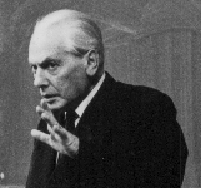
Alexander Müller was born in Kormorn, Hungary on May 6,
1895 into a traditional Jewish family. He grew up and went
to school in Hungary and later began studying medicine in Vienna.
These studies were interrupted in 1916 by World War I, when he
became a soldier and prisoner of war in Russia for four years.
After the war Müller returned to Vienna and became
a student and co-worker of Alfred Adler. He helped with the organization
of child guidance centers and was active in therapy, teaching,
lecturing, and the training of therapists.
In 1927 he married Klara Newmann. When the National Socialist
Party increased in power, the couple decided to emigrate. They
tried settling in Italy, France and Belgium, until they eventually
found shelter in Amsterdam. Here Dr. Müller founded an Individual
Psychology group.
During World War II when the Germans invaded Holland, Dr. Müller
and his wife went back to Hungary and eventually were interned
in a concentration camp. When that war was over, he and his wife
returned to Holland until 1952, when he accepted a position in
Zurich as lecturer for Individual Psychology at the Institute
for Applied Psychology.
Dr. Müller became Director of the Swiss Society of Individual
Psychology, and served as the First Secretary of the International
Association of Adlerian Psychology from 1954 to 1957. He retired
in 1961 to write a textbook for Individual Psychology. Seriously
ill, he did not finish this work. He continued as Director of
the Swiss Society and First Secretary of the International Association
for Individual Psychology until his death in 1968, in Zurich,
at the age of 73.
Edith Hass, a close friend and editor of his last book, offers
an inspiring overview of Müller's character and ability to
find meaning in adversity:
"Two events have marked him--as they did for so many of his generation--the
First World War and being a prisoner of war. This forced him
to live in the face of constant anger and death. The manner
in which he accepted his later fate, how he conducted his life
in spite of everything, and his understanding love for people was a source of strength for many. He did not survive from these unimaginable physical and spiritual human degradations broken and deeply wounded, but rather wiser, stricter and more demanding. Demands which were not only directed to himself,
but also to others. For Alexander Müller, to help a person continue on his path was to help him develop social consciousness,
to find YOU and ME in order to unfold the I. That is only possible
through demands on the self and self-discipline."
Elske Soghikian (Sophia's older daughter) recalls him fondly: "The most striking thing
about Dr. Alexander Müller was perhaps his eyes: cool, black
and penetrating, set in an almost sweet face full of freckles,
and showing dimples when he smiled. His inner depth and beauty
as a human being came through radiantly."
 Back to Home Page: Back to Home Page:
|



 Back to Home Page:
Back to Home Page: